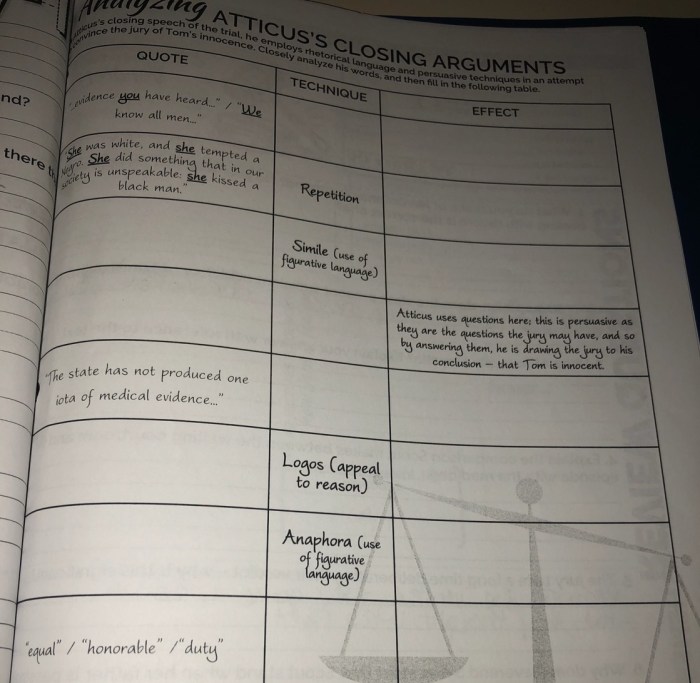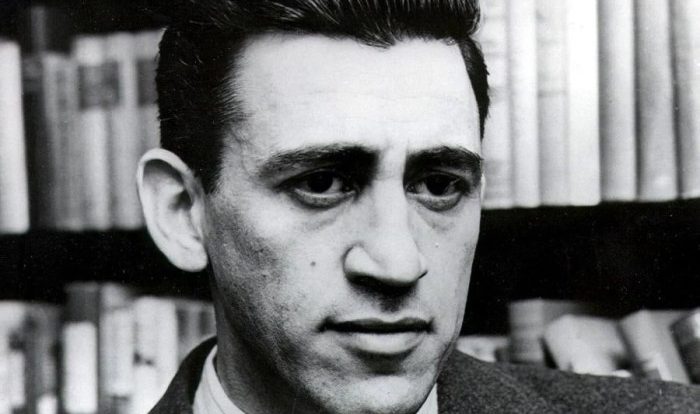Analyzing atticus’s closing arguments answer key – Analyzing Atticus’s Closing Arguments: Exploring Rhetorical Brilliance delves into the captivating world of “To Kill a Mockingbird,” meticulously examining the masterful closing arguments presented by Atticus Finch. Through an in-depth analysis of his speech, we embark on a journey to uncover the intricate rhetorical devices, profound characterization, and lasting impact that have cemented Atticus’s legacy as a beacon of justice and equality.
Atticus’s closing arguments stand as a testament to the power of words, skillfully crafted to sway the jury and resonate with generations of readers. By deconstructing the nuances of his speech, we gain invaluable insights into the art of persuasion and the enduring relevance of Atticus’s message in the pursuit of justice and social harmony.
Atticus Finch’s Closing Arguments: Overview: Analyzing Atticus’s Closing Arguments Answer Key

In “To Kill a Mockingbird,” Atticus Finch delivers a powerful closing argument that summarizes the trial’s main themes and appeals to the jury’s sense of justice and compassion. His speech focuses on the innocence of Tom Robinson, the inherent dignity of all people, and the importance of overcoming prejudice.
Main Points and Themes
- Tom Robinson is innocent of the charges against him.
- All people are equal and deserve to be treated with respect.
- Prejudice is a destructive force that must be overcome.
Rhetorical Devices and Techniques
Atticus employs various rhetorical devices to enhance the effectiveness of his arguments:
Metaphors
- Describes the jury as “the conscience of the town.”
- Compares prejudice to “a cancer in our society.”
Similes
- Likens the trial to “a play acted out in front of us.”
- Compares Mayella Ewell to “a little child in a fit of temper.”
Parallelism
- Repeats the phrase “you know the truth” to emphasize the jury’s duty.
- Uses contrasting language to highlight the differences between Tom and Bob Ewell.
Characterization of Atticus Finch, Analyzing atticus’s closing arguments answer key
Atticus’s closing arguments reveal his integrity, compassion, and belief in justice:
Integrity
- Stands up for what he believes in, even when it’s unpopular.
- Refuses to compromise his principles.
Compassion
- Treats everyone with respect, regardless of their race or background.
- Emphasizes the humanity of Tom Robinson.
Belief in Justice
- Believes that all people are entitled to a fair trial.
- Urges the jury to set aside their prejudices and judge Tom based on the evidence.
Quick FAQs
What is the central theme of Atticus’s closing arguments?
Atticus’s closing arguments revolve around the fundamental theme of justice and equality, emphasizing the inherent dignity of all individuals regardless of race or background.
How does Atticus use rhetorical devices to enhance his arguments?
Atticus employs a range of rhetorical devices, including metaphors, similes, and parallelism, to create vivid imagery, establish emotional connections, and drive home his points with undeniable force.
In what ways does Atticus’s characterization shape his closing arguments?
Atticus’s unwavering integrity, deep compassion, and unwavering belief in justice permeate his closing arguments, lending them a profound moral authority and emotional resonance.



